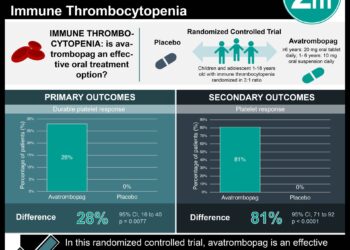Patient Basics: Thrombocytopenia
Originally published by Harvard Health.
What Is It?
Thrombocytopenia is an abnormally low level of platelets in the blood.
Platelets are made by the bone marrow. They help your blood to clot. People with thrombocytopenia can have excessive bleeding.
This condition can occur in varying degrees. The risk of bleeding increases as the platelet count decreases.
Thrombocytopenia can occur alone. Or, it can develop as a complication of another disease, such as cancer or a viral infection. In some cases, it is a chronic (long-lasting) condition that persists for years. In other cases, it develops suddenly and dramatically.
In general, thrombocytopenia develops for one or more of the following reasons:
- The body’s bone marrow fails to produce enough platelets. This can happen because:
- A cancer gets into the bone marrow and destroys megakaryocytes. These are the cells that produce platelets.
- Aplastic anemia affects platelet production.
- A toxic chemical, radiation therapy or chemotherapy destroys megakaryocytes.
- Genetic problems hinder production of normal platelets.
- Exposure to certain drugs or alcohol slows the production of megakaryocytes. Thrombocytopenia is common in heavy drinkers.
- After suffering from a viral infection, some patients will have decreased platelet production. This problem is usually short term and improves without treatment.
- The bone marrow produces enough platelets, but the body destroys them. The immune system can produce antibodies that attack platelets. Some causes of this problem include:
- Immune thrombocytopenic purpura (ITP). This condition can pass quickly or can last a long time. ITP can occur by itself or it can be associated with other autoimmune disorders, such as systemic lupus erythematosus (SLE)
- HIV infection. People infected with the virus sometimes develop low platelet counts.
- A complication of pregnancy. A small percentage of pregnant women develop a mild form of this condition when they are close to delivery.
- A reaction to a medication. Thrombocytopenia can be caused by any medication. For example, heparin, quinine and valproic example (Depakote) can trigger the immune system to make anti-platelet antibodies. In most cases, the condition develops within days of starting a new drug.
- Physical trauma. Platelets can be injured or destroyed as they pass through:
- An artificial heart valve
- A blood vessel graft
- Machines and tubing used in massive blood transfusions or cardiopulmonary bypass surgery
- Infections. The condition can develop after such infections as mononucleosis or cytomegalovirus.
- Thrombotic thrombocytopenic purpura (TTP). This is a rare disease. Blood clots form in the smallest arteries throughout the body. Platelets are consumed by this process. People with TTP also have anemia (low red blood cell count), fever, kidney malfunction and neurological symptoms.
- Too many platelets remain in the spleen. Normally, about one-third of your platelets are in your spleen. The rest are circulating in your blood. However, if the spleen gets larger because of severe liver disease, it can begin to hoard too many platelets. This leaves fewer platelets to circulate in your bloodstream.
Symptoms
People with severe thrombocytopenia may have abnormal bleeding almost anywhere in the body.
Symptoms can include:
- Reddish or purplish spots in the skin (called petechiae), often concentrated in the lower legs
- Excessive bruising, even from minor trauma
- Blood in the urine or stool
- Abnormal or excessive bleeding from the mouth or nose
- Abnormal vaginal bleeding, especially unusually heavy menstrual flow
- Bleeding inside the gastrointestinal tract, including bleeding from the rectum
- Excessive bleeding after surgery or dental work
- Headache and other neurological symptoms caused by bleeding inside the brain. This is extremely rare and only occurs when platelet counts become extremely low.
Diagnosis
Your doctor will begin by asking you about your medical history. He or she will ask about:
- Recent medical procedures or hospitalizations (people often get heparin in the hospital to prevent blood clots)
- Whether you have received any blood transfusions
- Current medications (including over-the-counter and herbal remedies)
- How much alcohol you drink
- Your diet
- Recent infections or vaccinations
- If you have any achy joints or rashes
- If anyone in your family has ever had low platelets levels
- If you are pregnant, your physician will want to know your due date.
Your doctor will examine you for specific signs of abnormal bleeding. These include bruises or blood spots in your skin. He or she also will feel your abdomen to determine whether your spleen is enlarged. The doctor will look for any signs of liver disease.
To confirm the diagnosis, your doctor will order a blood test. The blood test will measure the number of platelets in your blood. Additional blood tests will be ordered at the same time to help diagnose why you have thrombocytopenia.
If your doctor thinks you may be having a reaction to a drug, he or she may ask you to stop taking the medication. The doctor will then see if your platelet count rises. If that happens, you have drug-induced thrombocytopenia.
Your doctor may recommend a bone marrow biopsy. In this procedure, a long needle is used to remove a small piece of bone marrow. The marrow is examined in a laboratory. The appearance of your bone marrow and platelet-producing cells help to determine what is causing your problem.
Expected Duration
How long thrombocytopenia lasts depends on its cause.
For example, some patients with chronic ITP experience years of easy bruising and abnormally heavy vaginal bleeding. They may have repeated episodes of more severe bleeding.
Most children with acute ITP recover within four to six weeks.
Some people have such mild disease that they almost never have noticeable bleeding problems.
Many people with drug-induced thrombocytopenia recover within 7 to 10 days after they stop taking the medication.
Prevention
Many cases of thrombocytopenia cannot be prevented.
You can avoid drinking large amounts of alcohol to lower your risk of developing alcohol-related thrombocytopenia.
If you already have had one episode of drug-induced thrombocytopenia, the problem is likely to return if you take the same medication again. To help prevent this, record the name of the specific medication that caused the problem. Tell every health care professional that you visit about your sensitivity to this drug.
If your doctor has determined that you are at risk of developing this condition, he or she may tell you not to take aspirin. That is because aspirin impairs platelet function.
Treatment
How thrombocytopenia is treated depends on its cause and severity.
If your thrombocytopenia is mild and is not causing any significant bleeding, you may not need treatment. This is often the standard strategy in children with acute ITP. Most children recover without treatment within 6 weeks.
If your thrombocytopenia is drug induced, your physician may change your prescription. Most people recover without additional treatment after they stop taking the medication.
Patients with more significant bleeding will need more aggressive treatment. Options for treatment include:
- Medications. Glucocorticoids may be taken intravenously or by mouth. Immunoglobulin may be given intravenously. These medications treat thrombocytopenia caused by an abnormal immune reaction.
- Platelet transfusions. Transfusions of platelets usually are reserved for patients with active bleeding or a high risk of bleeding.
- Splenectomy (surgical removal of the spleen). This may be necessary if ITP that has not improved with other treatment. If the spleen is removed, thrombocytopenia goes away in more than half of ITP patients. If removing the spleen doesn’t help, immunosuppressive drugs may be given.
When To Call A Professional
Call your doctor if you develop any of the symptoms of thrombocytopenia. Be sure to call if you notice abnormal bruises or if you experience significant bleeding from your nose, mouth, vagina, rectum or urinary tract.
Prognosis
The overall outlook is generally good. This is especially true if the cause can be identified and removed. Long-term management of the condition is often successful.
Additional Info
National Heart, Lung, and Blood Institute (NHLBI)
6701 Rockledge Drive
P.O. Box 30105
Bethesda, MD 20824-0105
Phone: (301) 592-8573
http://www.nhlbi.nih.gov/




